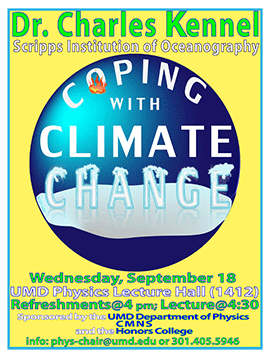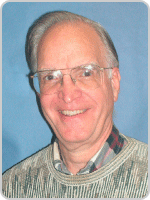- Details
-
Published: Wednesday, August 28 2013 15:56
Condensed Matter Theory Lecture Set for September 24 at UMD
COLLEGE PARK, Md. -- Nobel laureate David Gross of the University of California, Santa Barbara and the Kavli Institute for Theoretical Physics has been named the 2013 recipient of the Richard E. Prange Prize and Lectureship in Condensed Matter Theory and Related Areas. Dr. Gross will receive a $10,000 honorarium and deliver a public lecture entitled "Frontiers of Fundamental Physics” at the University of Maryland, College Park, on September 24, 2013. He will also present a Condensed Matter Theory Center seminar entitled “Quantum Field theory: Past, Present, Future” on Monday, September 23, 2013.
The Prange Prize, established by the UMD Department of Physics and Condensed Matter Theory Center (CMTC), honors the late Professor Richard E. Prange, whose distinguished professorial career at Maryland spanned four decades (1961-2000). The Prange Prize is made possible by a gift from Dr. Prange's wife, Dr. Madeleine Joullié, a Professor of Chemistry at the University of Pennsylvania.
Gross received his bachelor's degree in physics and mathematics from the Hebrew University of Jerusalem, and his Ph.D. in physics from the University of California, Berkeley. He was appointed a Harvard Junior Fellow, and thereafter served for 27 years on the faculty at Princeton University. From 1997-2012, he directed the Kavli Institute for Theoretical Physics at UCSB, where he remains a Permanent Member. Gross holds the Frederick W. Gluck Chair in Theoretical Physics at UCSB.
Working at Princeton in 1973, Gross and his PhD student Frank Wilczek discovered asymptotic freedom, which holds that the closer quarks are to each other, the weaker the interaction (color charge) between them; in extreme proximity, quarks behave almost as free particles. This insight helped lead to the Standard Model of particle physics. Gross and Wilczek shared the 2004 Nobel Prize in physics with David Politzer for this breakthrough. Another of Gross’ Princeton PhD students, Edward Witten, won the Fields Medal in 1990. Gross is also well known for the Gross–Neveu field theory model devised with André Neveu and for heterotic string theory (with Jeffrey Harvey, Emil Martinec and Ryan Rohm). Like the late Richard Prange himself, Gross has been keenly interested in the physics of quantum Hall effects, writing several important papers, notably with Édouard Brézin.
In addition to being one of the most influential theoretical physicists of the last 50 years, David Gross has been unstinting in his national and international service to the cause of theoretical physics, not only in his role as the Director of the prestigious KITP, but also as the chair of various advisory boards for theory centers all over the world such the Solvay Institute in Belgium, the KITPC in China, and the ICTS in India.
Gross’ Prange Prize lecture will be delivered at the University of Maryland's John S. Toll Physics Building at 4:00 p.m. on Tuesday, Sept. 24 in the lecture hall, Room 1412. The event is open to the public. Dr. Gross will also present a seminar entitled “Quantum Field Theory: Past, Present, Future” on Monday, September 23 at 11:00 am in Room 2324 of the Computer and Space Sciences Building, in conjunction with the Joint Quantum Institute.
At the University of Chicago, Richard Prange received his PhD under Nobelist Yoichiro Nambu and also worked with Murray Gell-Mann and Marvin Goldberger. At the University of Maryland, he edited a highly-respected book on the quantum Hall effect and made important theoretical contributions to the subject. His interests extended into all aspects of theoretical physics, and continued after his retirement. Dr. Prange was a member of the Maryland condensed matter theory group for more than 40 years and was an affiliate of CMTC since its inception in 2002.
"Richard enjoyed a fascinating and fulfilling career at the University of Maryland exploring condensed matter physics, and even after retirement was active in the department," said Dr. Joullié. "He spent the very last afternoon of his life in the lecture hall for a colloquium on graphene, followed by a vigorous discussion. And so I was happy to institute the Prange Prize, to generate its own robust discussions in condensed matter theory."
"The Prange Prize provides a unique opportunity to acknowledge transformative work in condensed-matter theory, a field that has proven to be an inexhaustible source of insights and discoveries in both fundamental and applied physics,” said Dr. Sankar Das Sarma, who holds the Richard E. Prange Chair in Physics at UMD and is also a Distinguished University Professor and Director of the CMTC.
Since its initiation in 2009, the Prange Prize has been awarded to Nobelists Philip W. Anderson (2009), Walter Kohn (2010), Daniel Tsui (2011) and Andre Geim (2012).
###
Parking is available in the Regents Drive Garage, across the street from the Physics lecture hall; an attendant will direct visitors within the garage. A free ShuttleUM bus runs to and from the College Park Metro station at about eight-minute intervals.
Directions to the College Park campus can be found here: http://www.cvs.umd.edu/visitors/maps.html
To locate the Physics Building, see the campus map at: http://www.cvs.umd.edu/downloads/campus%20map%20012309.pdf .
University of Maryland Physics: http://umdphysics.umd.edu/ Weekly colloquia: http://www.umdphysics.umd.edu/events/physicscolloquia.html
College of Computer, Mathematical and Natural Sciences: http://www.cmns.umd.edu/
Condensed Matter Theory Center: http://www.physics.umd.edu/cmtc/
UMD Physics colloquia: http://umdphysics.umd.edu/index.php/events/32-events/701-physicscolloquia.html


